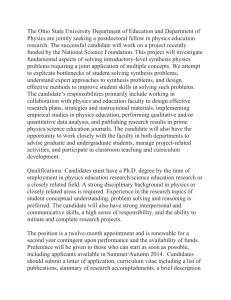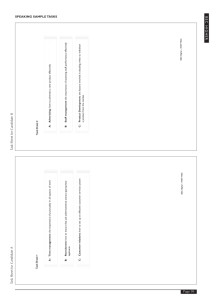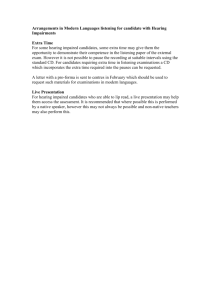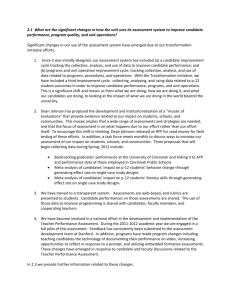Basic Info BEC Exams
advertisement
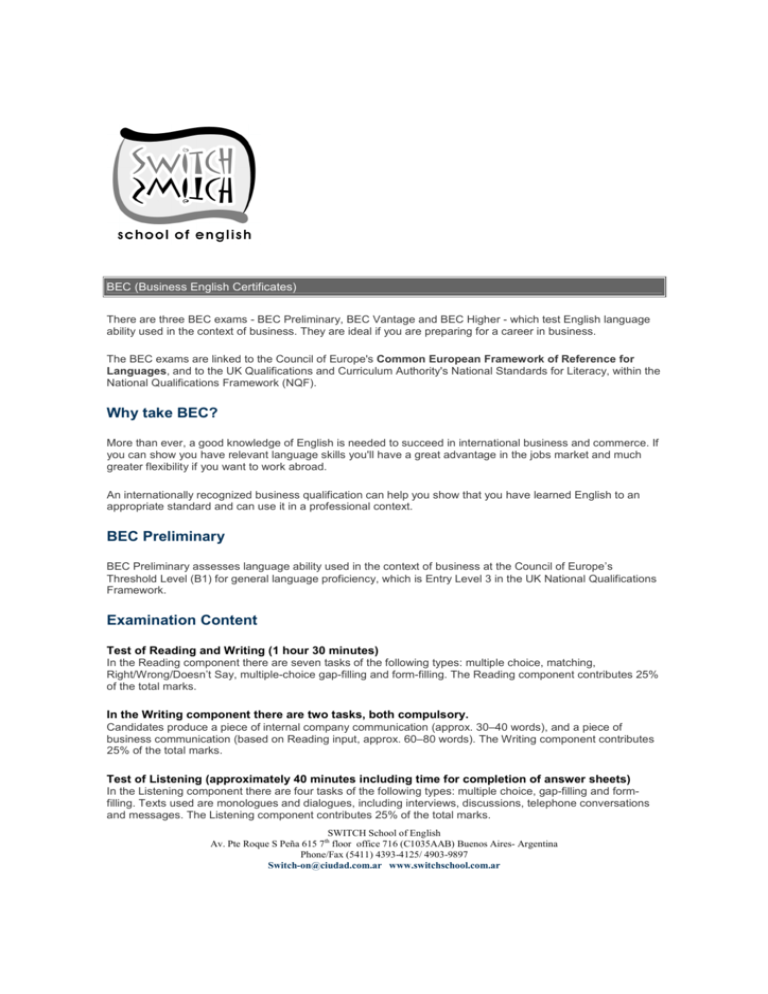
BEC (Business English Certificates) There are three BEC exams - BEC Preliminary, BEC Vantage and BEC Higher - which test English language ability used in the context of business. They are ideal if you are preparing for a career in business. The BEC exams are linked to the Council of Europe's Common European Framework of Reference for Languages, and to the UK Qualifications and Curriculum Authority's National Standards for Literacy, within the National Qualifications Framework (NQF). Why take BEC? More than ever, a good knowledge of English is needed to succeed in international business and commerce. If you can show you have relevant language skills you'll have a great advantage in the jobs market and much greater flexibility if you want to work abroad. An internationally recognized business qualification can help you show that you have learned English to an appropriate standard and can use it in a professional context. BEC Preliminary BEC Preliminary assesses language ability used in the context of business at the Council of Europe’s Threshold Level (B1) for general language proficiency, which is Entry Level 3 in the UK National Qualifications Framework. Examination Content Test of Reading and Writing (1 hour 30 minutes) In the Reading component there are seven tasks of the following types: multiple choice, matching, Right/Wrong/Doesn’t Say, multiple-choice gap-filling and form-filling. The Reading component contributes 25% of the total marks. In the Writing component there are two tasks, both compulsory. Candidates produce a piece of internal company communication (approx. 30–40 words), and a piece of business communication (based on Reading input, approx. 60–80 words). The Writing component contributes 25% of the total marks. Test of Listening (approximately 40 minutes including time for completion of answer sheets) In the Listening component there are four tasks of the following types: multiple choice, gap-filling and formfilling. Texts used are monologues and dialogues, including interviews, discussions, telephone conversations and messages. The Listening component contributes 25% of the total marks. SWITCH School of English Av. Pte Roque S Peña 615 7th floor office 716 (C1035AAB) Buenos Aires- Argentina Phone/Fax (5411) 4393-4125/ 4903-9897 Switch-on@ciudad.com.ar www.switchschool.com.ar Test of Speaking (approximately 12 minutes per pair of candidates) The Speaking Test is conducted by two external examiners and candidates are tested in pairs. At centres with an uneven number of candidates, the last single candidate is examined with the last pair in a group of three. (N.B. The group of three format may only be used to deal with uneven numbers, unexpected absence of candidates, illness, etc. It is not an option that may be selected in normal circumstances where there is an even number of candidates at a session.) There are four tasks in which each candidate responds to questions, gives a ‘mini-presentation’ lasting approximately one minute, takes part in a collaborative task with the other candidate and takes part in a discussion with the other candidate and the interlocutor. The Speaking component contributes 25% of the total marks. BEC Vantage BEC Vantage assesses language ability used in the context of business at the Council of Europe’s Vantage Level (B2) for general language proficiency, which is Level 1 in the UK National Qualifications Framework. Examination Content Test of Reading (1 hour) In the Reading component there are five tasks of the following types: multiple choice, matching, sentence level gap-filling, multiple-choice gap-filling and error identification. The Reading component contributes 25% of the total marks. Test of Writing (45 minutes) In the Writing component there are two tasks, both compulsory. Candidates produce a piece of internal company communication (approx. 40–50 words), and a short report, proposal or piece of business correspondence (based on Reading input, approx. 120–140 words). The Writing component contributes 25% of the total marks. Test of Listening (approximately 40 minutes including time for completion of answer sheets) In the Listening component there are three tasks of the following types: gapfilling or note completion, matching and multiple choice. Texts used are monologues and dialogues, including interviews, discussions, telephone conversations and messages. The Listening component contributes 25% of the total marks. Test of Speaking (approximately 14 minutes per pair of candidates) The Speaking Test is conducted by two external examiners and candidates are tested in pairs. At centres with an uneven number of candidates, the last single candidate is examined with the last pair in a group of three. (N.B. The group of three format may only be used to deal with uneven numbers, unexpected absence of candidates, illness, etc. It is not an option that may be selected in normal circumstances where there is an even number of candidates at a session.) There are four tasks in which each candidate responds to questions, gives a ‘mini-presentation’ lasting approximately one minute, takes part in a collaborative task with the other candidate and takes part in a discussion with the other candidate and the interlocutor. The Speaking component contributes 25% of the total marks. SWITCH School of English Av. Pte Roque S Peña 615 7th floor office 716 (C1035AAB) Buenos Aires- Argentina Phone/Fax (5411) 4393-4125/ 4903-9897 Switch-on@ciudad.com.ar www.switchschool.com.ar BEC Higher BEC Higher assesses language ability used in the context of business at the Council of Europe’s Effective Operational Proficiency Level (C1) for general language proficiency, which is Level 2 in the UK National Qualifications Framework. Examination Content Test of Reading (1 hour) In the Reading component there are six tasks of the following types: multiple choice, matching, word level gapfilling, sentence level gap-filling, multiple choice gap-filling and error identification. The Reading component contributes 25% of the total marks. Test of Writing (1 hour 10 minutes) In the Writing component there are two tasks. In Part One candidates produce a short report (based on graphic input, approx. 120–140 words). In Part Two candidates choose whether to write a report, proposal or piece of business correspondence. The Writing component contributes 25% of the total marks. Test of Listening (approximately 40 minutes including time for completion of answer sheets) In the Listening component there are three tasks of the following types: gapfilling or note completion, matching and multiple choice. Texts used are monologues and dialogues, including interviews, discussions, telephone conversations and messages. The Listening component contributes 25% of the total marks. Test of Speaking (approximately 16 minutes per pair of candidates) The Speaking Test is conducted by two external examiners and candidates are tested in pairs. At centres with an uneven number of candidates, the last single candidate is examined with the last pair in a group of three. (N.B. The group of three format may only be used to deal with uneven numbers, unexpected absence of candidates, illness, etc. It is not an option that may be selected in normal circumstances where there is an even number of candidates at a session.) There are four tasks in which each candidate responds to questions, gives a ‘mini-presentation’ lasting approximately one minute, takes part in a collaborative task with the other candidate and takes part in a discussion with the other candidate and the interlocutor. The Speaking component contributes 25% of the total marks. Results A single, overall grade is awarded, based on the aggregate of marks gained in the four components indicated above. There are no pass/fail marks for individual components, hence there is no requirement to reach a particular level in any component in order to achieve a pass in the examination. Three classes of passing grade are available, A, B and C, and two classes of failing grade, D and E. All candidates are provided with a Statement of Results which includes a graphical display of the candidate’s performance in each paper. These are shown against the scale Exceptional – Good – Borderline – Weak and indicate the candidate’s relative performance in each paper. Passing candidates are awarded a certificate. SWITCH School of English Av. Pte Roque S Peña 615 7th floor office 716 (C1035AAB) Buenos Aires- Argentina Phone/Fax (5411) 4393-4125/ 4903-9897 Switch-on@ciudad.com.ar www.switchschool.com.ar

